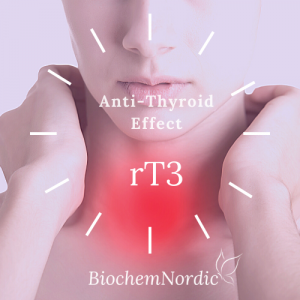Anti-Thyroid Effect of Reverse T3


BiochemNordic
What are T4, T3 and reverse T3?
The human thyroid gland is butterfly-shaped in the front of the neck. This gland produces and secretes two thyroid hormones called T4 and T3. It is T3 that acts on the cells to increase metabolism, pulse rate, and body temperature.
T4 is a storage hormone, which in itself is inactive, but it can be converted to the active thyroid hormone T3. This convention takes place mainly in the liver. Under normal circumstances, small amounts of T4 are also converted into what is called reverse T3 or rT3.
If you want to know more about your thyroid health, including Reverse T3, I recommend reading my book “Test Your Thyroid Function“.
What is the danger of Reverse T3?
Reverse T3 is an inactive form of T3. Reverse T3 is produced from T4 instead of the active thyroid hormone T3. Overproduction of reverse T3 is dangerous because it binds to T3 receptors on cells, but it doesn’t increase the metabolic rate as T3 does. Put in another way reverse T3 lowers the metabolic rate by binding to the T3 receptor instead of T3. In effect, it blocks T3 at a cellular level.
The amount of reverse T3 produced is as mentioned usually very small. However, reverse T3 production can increase with illness, stress or inflammation, starvation, low blood sugar, etc.
Reverse T3 is an evolutionary adaptation. During times of stress, famine, or starvation, reverse T3 increases, to slow the metabolic rate and conserve energy.
Another situation where the body overproduces reverse T3 is when the body senses too large an amount of T4, such as will be the case if a hypothyroid person with a conversion defect uses a T4-only medication. The overproduction of reverse T3 happens as a reaction to the accumulated T4, resulting in a strong anti-thyroid effect.
Will High T4 produce reverse T3?
One would think that a thyroid medication for treating low thyroid function would always contain the same ratio of hormones as the human gland produces, but that is not the case.
Most people with low thyroid function are treated with T4-only medications, some common brand names are Synthroid, Levoxyl, L Thyroxine, Levo T, Levothroid, and Levothyroxine.
The effect of synthetic T4 medication was tested on healthy young male students, and in those individuals, T4 works perfectly as healthy young males have strong livers and thus have no problem converting T4 to T3.
However, women and or sick or stressed people who have weaker liver function often have issues with the conversion of the inactive T4 to the active T3.
People on pure T4 medication often feel they need to increase their thyroid medication as their symptoms of low thyroid function persist. However increasing the use of T4 can create problems if it is not converted to T3. The accumulated T4 increases the production of reverse T3, which lowers thyroid function by competing with T3 on the cellular level.
How do you treat high reverse t3?
Usually using a combination treatment with both T4 and T3 helps avoid the issues with accumulated T4 and increased reverse T3. The combination treatment could be in the form of a natural desiccated thyroid supplement or it could be a combination of synthetic T4 and T3.
I do not prescribe medication but I can help you understand what the best type of thyroid medication is for you.
In my Thyroid Medication Guide, I detail Dr. Ray Peat’s thyroid medication recommendations.
For those navigating the complexities of thyroid medication adjustments, it’s crucial to have the support of an experienced thyroid specialist. I often do Video Counseling with people who are using some sort of thyroid medication.
If you want to know more about blood tests for reverse T3 and how to interpret all your different thyroid blood test results, I recommend getting my book ” Test Your Thyroid Function, which is available on all Amazon platforms.
Here is the link to ” Test Your Thyroid Function” on Amazon US.


